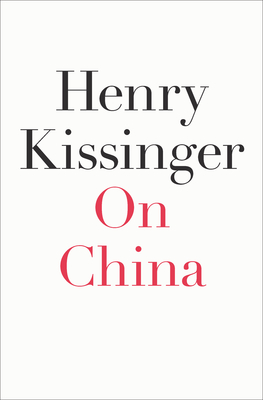On China by Henry Kissinger (Allen Lane 2011)
Before 1969 the People's Republic of China and USSR were seen as one large Communist bloc whose power centre was in Moscow however as 1969 rolled around and Russian troops massed on the Chinese border, nuclear war between Russia and China appeared probable (so much so that Chinese leaders were dispersed from Beijing around the country). At this point President Nixon decided that Russia was the worse of the two evils which made possible a heretofore unlikely meeting with Chairman Mao in 1972 and a relatively stable period of peaceful co-existence has existed between the USA and China since.
Henry Kissinger was the National Security Advisor to Nixon and was a key figure in setting up the meeting between the unlikely bedfellows. His book charts the history of China from its ancient origins, commenting on the nature of Chinese society and its early belief in its own superiority in the world, not in a proselytizing or crusading manner as one thinks of the neo-con crusade for the democratisation of the third world, but through sheer confidence in ones cultural superiority. And this confidence was badly shaken following the opium wars with the UK with one embarrassing concession after another to host of Western nations on trade, diplomatic relations and even ownership of Chinese lands.
It deals with the civil war that led to the Communist victory (the nationalists escaping to settle what is now known as Taiwan) as well as successive Communist policy blunders such as the Great Leap Forward, an aim to increase industrial output rapidly to overtake the West in 15 years with goals so unrealistic that local officials faked their grain figures which were then relied upon as Mao sold off much of China's remaining grain to Russia in exchange for weapons triggering a famine that killed as many as 45 million people. There is also the Cultural Revolution, part of Mao's vision of continual revolution, an attempt to wipe out all traces of China's Confucian inspired civil service in which many senior mandarins were removed from their positions and sent to labour in the fields, including in their ranks the future leads of the country Deng Xiaoping and Jiang Zemin and very nearly Mao's right hand man Zhao Enlai.
The book is a very useful grounding in modern Chinese political history and it is interesting to observe Chinese foreign policy from the viewpoint of a game of Wei Qi in which two players place down respectively black and white tiles, the object being to encircle ones enemy. Kissinger is at some times almost an apologist for Mao and whilst some of the worst excesses are noted, more effort is put into understanding his decisions in the framework of Chinese history. An explanation for the softer tone towards Mao could be to lesson the burden of being the man to have established relations with a man responsible for more that 45 million deaths.
Henry Kissinger is very much a Republican and top marks to American forgeign policy go to Nixon, Reagan and both Bushes. Clinton and Carter are both criticised as being too gun-ho about trying to spread and apply Western values in a Chinese context.
Whatever the problems with this book I would certainly recommend it as an introductory book on Modern China because it is one that will make you want to read more.
4/5
Tim MacGabhann: Saints
4 months ago







0 comments:
Post a Comment